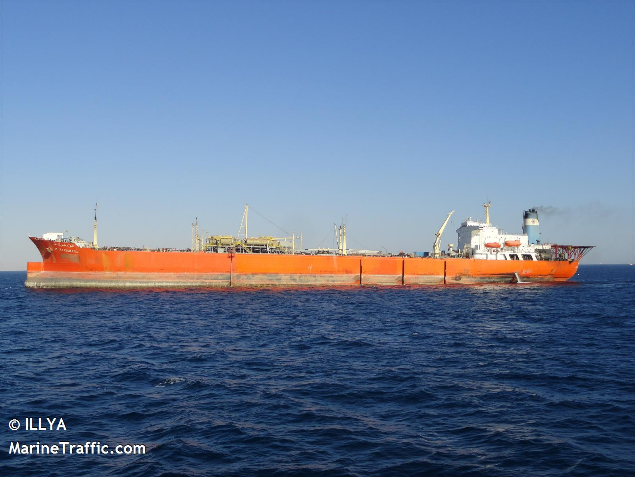Numerical Studies Fatigue Damage From Material Variations Catenary Mooring System FPSO Al Zaafarana
Main Article Content
Abstract
When operating, the FPSO receives environmental loads in the form of currents, wind and waves so mooring ropes are required (mooring line). Mooring line is a way to dampen the movement of the Al Zaafarana FPSO which allows it to move freely in the direction of the load. However, several cases of mooring rope accidents occurred including material fatigue of 20%, deployment 17%, and corrosion 11%. So the aim of this research is to analyze motion trajectory (surge and sway), mooring line stress, and deterministic fatigue on mooring line so you get it fatigue damage material catenary mooring line for FPSO Al Zaafarana. Thus, it is hoped that this research can make a scientific contribution in improving the quality and safety of materials mooring line for the Al Zaafarana FPSO, as well as increasing the efficiency of the oil drilling process. This research method uses a numerical study approach as a secondary data source with modeling and simulation using software as well as literature analysis that will support the numerical simulation results. From the results of numerical studies obtained fatigue damage The highest is the material type chain for FPSO Al Zaafarana. One of the reasons is that the mass of the rope is not proportional to the displacement of the ship, so a larger mass of rope is needed or an increase in the number of ropes. In addition, the numerical study simulation only uses 100 seconds so that the movement process only reaches movement transient namely temporary changes that occur in the transition phase before reaching a stable condition.
Downloads
Article Details

This work is licensed under a Creative Commons Attribution 4.0 International License.
References
Arifin, "Numerical Prediction of FPSO Instability Moored at Buoy Due to Failure of Mooring Line". ITS Engineering Journal, vol. 1, no. 1, 2012.
B.S. Prasodjo, W.D. Aristanto, and D.F. Ashyar, "Long Optimization Study Mooring Line Tipe Spread Mooring on F(P)SO", JournalWave, vol. 5, no. 1, hlm. 13-19, 2011.
J. Sade, “Literature Study Of The Effectiveness Of Flexible Pads As Submarine Pipeline Protection Due To Anchor Falls”, CBCER, vol. 1, no. 2 Desember, pp. 1–9, Dec. 2023.
F. Husain, “Impact and Failure of Internal Pressure of Pipe Connections C Influenced by Sea Water”, CBCER, vol. 1, no. 2 Desember, pp. 68–77, Dec. 2023.
H. Hamzah, “Study Of The Effectiveness Of Subsea Pipeline Leak Detection Methods”, CBCER, vol. 1, no. 2 Desember, pp. 45–56, Dec. 2023.
M. F. Bin Yusup, “Risk Evaluation and Damage Mitigation in Subsea Pipelines: A Literature Review of Concepts, Applications, and Challenges”, CBCER, vol. 1, no. 2 Desember, pp. 97–100, Dec. 2023.
M. Riayadh, “Literature Review on Integrity Management of Subsea Pipelines Operating Beyond Design Life”, CBCER, vol. 1, no. 2 Desember, pp. 88–92, Dec. 2023.
N.D. Aditia, "Analytical, Numerical and Experimental Study of SPAR Structure Movement and Tension Dynamics of Link Type Mooring Systems in Mooring Rope Failure Conditions". Department of Ocean Engineering. Faculty of Marine Technology. Sepuluh Nopember Institute of Technology. 2017
J. Sade, “Review of Marine Pipe Repair Methods in Indonesia”, CBCER, vol. 1, no. 2 Desember, pp. 10–17, Dec. 2023.
F. Husain, “Reliability Analysis Of Subsea Pipelines In High Wave Random Conditions”, CBCER, vol. 1, no. 2 Desember, pp. 78–83, Dec. 2023.
A. Sadat, and M.N. Misbah, "Fatigue Life Analysis (Fatigue Life) Scantling Support Structure Module FSO Cinta Natomas", ITS Engineering Journal, vol. 1, no. 1, pp. 307-310, 2012.
. Zhang, X., Li, Y., & Li, C. "Influence of water depth on the dynamic response of FPSO mooring systems." Ocean Engineering, 166, 1-13, (2018).
T. Rachman, “Feasibility Study Of Subsea Pipeline Crossing Plan”, CBCER, vol. 1, no. 2 Desember, pp. 57–67, Dec. 2023.
H. Hamzah, “Study On The Application Of The Articulated Concrete Block Mattresses Method As Subsea Pipeline Protection”, CBCER, vol. 1, no. 2 Desember, pp. 37–44, Dec. 2023.
A.R.Jurais, "Motion and Mooring Analysis in Planning Floating Breakwater Structure In Nagan Raya, Aceh". Department of Marine Engineering. Faculty of Marine Technology. Sepuluh Nopember Institute of Technology. 2018.
A. Y. Kyew, “Problems and Solutions in Improving Subsea Pipeline Competency and Quality: A Comprehensive Literature Review”, CBCER, vol. 1, no. 2 Desember, pp. 93–96, Dec. 2023.
I.A.I. Ismail, "Strength Analysis Anchor Crown Shackle At FPU Madura Straightt With Angle VariationsMooring Line". Department of Marine Engineering. Faculty of Engineering. Hasanuddin University. 2021.
F. M. Assidiq, D. Paroka, M.Z. Muis, dan S. Klara, "Fatigue Analysis of Catenary Mooring System due to Harsh Environment in Head Seas", AND International Journal of Engineering, vol. 1, no. 1, hlm. 30-38, 2018.
S. Rahman, “Vibration Characteristics and Reduction Analysis of the Lifting Pipe Below Sea Wave”, CBCER, vol. 1, no. 2 Desember, pp. 18–28, Dec. 2023.
J.R. Thalita, "Tandem Performance and Operability Study Offloading "With Variations in the Mooring System on the SSP Type FPSO". Department of Marine Engineering. Faculty of Marine Technology. Institut Teknologi Sepuluh Nopember. 2017.
Sumardiono, "Estimation of Fatigue Life (Fatigue Life) FSO Construction (Floating Storage and Offloading) with MethodSpectral-Based Fatigue Analysis". Field of Marine Building Design Engineering Expertise. Faculty of Marine Technology. Sepuluh Nopember Institute of Technology. 2015.
B. Hariyanto, "Stress AnalysisMooring Line OnSingle Point Mooring Calm Bouy Cilaca". Department of Marine Engineering. Faculty of Marine Technology. Sepuluh Nopember Institute of Technology. 2018.
N. Zin Latt, “ Literature Review of Concepts, Applications, and Challenges in Subsea Pipeline Risk and Reliability Management”, CBCER, vol. 1, no. 2 Desember, pp. 84–87, Dec. 2023.

